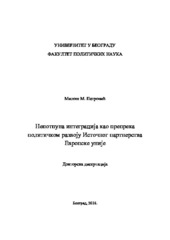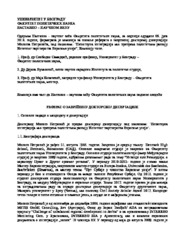Приказ основних података о дисертацији
Непотпуна интеграција као препрека политичком развоју источног партнерства Европске уније
Incomplete integration as an obstacle to political development of the European Union's Eastern Partnership
| dc.contributor.advisor | Kovačević, Maja | |
| dc.contributor.other | Kovačević, Maja | |
| dc.contributor.other | Samardžić, Slobodan | |
| dc.contributor.other | Vukasović, Dejana | |
| dc.creator | Petrović, Miloš M. | |
| dc.date.accessioned | 2019-01-25T15:28:35Z | |
| dc.date.available | 2019-01-25T15:28:35Z | |
| dc.date.available | 2020-07-03T09:43:07Z | |
| dc.date.issued | 2018-10-09 | |
| dc.identifier.uri | https://nardus.mpn.gov.rs/handle/123456789/10672 | |
| dc.identifier.uri | http://eteze.bg.ac.rs/application/showtheses?thesesId=6543 | |
| dc.identifier.uri | https://fedorabg.bg.ac.rs/fedora/get/o:19302/bdef:Content/download | |
| dc.identifier.uri | http://vbs.rs/scripts/cobiss?command=DISPLAY&base=70036&RID=50912783 | |
| dc.description.abstract | Димензија Источно партнерство европске суседске политике, нарочито у домену политичког придруживања, поседује значајне недоследности, недостатке и непрецизности у концептуалном, интеграционом и стратешком аспекту који отежавају функционисање и унапређење њеног развоја. У сарадњи с источним суседима ЕУ користи ”делотворне” алате из приступног процеса, који су дали резултате у средњeевропским државама које су биле обухваћене политиком проширења. Ипак, у погледу развоја односа са источним партнерима у оквирним актима и другим документима Партнерства препознају се краткорочне и средњерочне, али остају недовршене дугорочне политичке амбиције те иницијативе, па Европска унија тежи да их ”заобиђе” праћењем процеса мањкаво постављене непотпуне интеграције по угледу на политику проширења, што представља проблемску област дисертације. У складу с постављеним хипотезама, употребом аналитичких, упоредних и других метода, уз емпиријске илустрације, описивани су и тумачени изазови и појаве који доводе до третирања суверених источних суседа подражавањем модела приступног процеса, што је непримерено и представља идеју „приступање минус чланство“ која не доприноси аутономном развоју политике Источно партнерство нити даје значајније резултате у интеграционом погледу. Под претпоставком да је европски план за источне суседе дугорочно одређенији, концпептуално усклађен и да адекватније уважава специфичности и изазове тог региона, примена европских стандарда и норми у тим земљама би могла да буде квалитетнија, имајући у виду да би многим партнерима јаснија визија политичке будућности, макар она не подразумевала пријем у ЕУ, вероватно више значила него дугогодишње подражавање приступног процеса без изјашњавања о дугорочној политичкој перспективи развоја. Истраживање је показало да је концепт источног суседства у актуелном облику двоструко мањкав: не омогућава перспективу чланства источним партнерима, нити је дугорочно и адекватно дефинисао кредибилну алтернативу у виду привилегованог партнерског политичког региона који би имао своје предности у односу на неке друге територије. Уместо да води формирању привилегованог простора у оквиру којег се „добровољно“ преузимају европски стандарди, данас источни суседи више наликују на објекте изложене „спољном управљању“ са мањком аутономног одлучивања. Дихотомија између потребе за очувањем ексклузивитета Уније и тежње за привлачењем и обликовањем суседа присутна је у свим аспектима Источног партнерства, али није ваљано артикулисана на начин који предвидиво, одрживо и обострано прихватљив начин развија сарадњу, већ одржава неравноправне позиције две стране, што не одговара партнерским односима. Поред тога, перспективе достизања пуних капацитета те политике без одређивања приоритета и простора за одређени ниво сарадње Европске уније, али и источних суседа, са Русијом - доста су упитне... | sr |
| dc.description.abstract | The Eastern Partnership dimension of European Neighbourhood Policy, especially in domain of political association, contains significant inconsistencies, deficiencies and imprecision in conceptual, integrational and strategic aspect which inhibit its functioning and further advancement. In cooperation with its eastern neighbors, the European Union uses the „effective“ tools from the accession process, which delivered results in central European countries which were part of the enlargement policy. However, in terms of development of cooperation with the eastern partners, the framework acts and other partnership documents contain short-term and middle-term, with incomplete long-term political ambitions of that initiative, so the European Union aims to „circumvent“ this by following the process of an deficiently established incomplete integration modelled upon the enlargement policy, which represents the problem area of this dissertation. In accordance with the research hypotheses and analitical, comparative and other methods, through empirical examples, challenges and phenomenona which lead to treating the sovereign eastern partners by simulating the accession process are described and interpreted as an inappropriate idea of „accession minus membership“ which doesn’t contribute to the autonomous development of the Eastern Partnership policy, nor it delivers more significant integration results. Provided that the European plan for eastern neighbors is long-term defined, conceptually adjusted and adequately addresses the specificities and regional challenges, the implementation of EU standards and norms in those countries could achieve better quality, having in mind that many partners would prefer a more precise vision of their political future (even if it didn’t envisage EU membership), rather than a lengthy imitation of accession process with an inconclusive long-term political perspective. Research has shown that the Eastern neighbourhood concept in its current form is twofold-deficient: it doesn’t enable the membership perspective to eastern partners, nor it has defined a credible long-term alternative in the form of privileged political partnership region which would have its own benefits in comparison with other regions. Instead of leading towards formation of a privileged area within which European standards would be “voluntarily exported”, today eastern neighbors more resemble objects exposed to an “external control”, with lack of autonomous competences. The dichotomy between the need to preserve the exclusiveness of the European Union and its necessity to attract and shape its neighbors is present in all aspects of the Eastern Partnership but is not well articulated in a way which develops cooperation in a predictable, sustainable and mutually acceptable manner, but it rather sustains the uneven positions between two sides, which doesn’t correspond to partner relations. Apart from that, the perspective of reaching the policy’s full capacity without setting priorities and space for a certain level of cooperation of EU and the eastern partners with Russia is highly questionable... | en |
| dc.format | application/pdf | |
| dc.language | sr | |
| dc.publisher | Универзитет у Београду, Факултет политичких наука | sr |
| dc.rights | openAccess | en |
| dc.rights.uri | https://creativecommons.org/licenses/by-nc-nd/4.0/ | |
| dc.source | Универзитет у Београду | sr |
| dc.subject | Источно партнерство | sr |
| dc.subject | Eastern Partnership | en |
| dc.subject | European Neighborhood Policy | en |
| dc.subject | Enlargement Policy | en |
| dc.subject | European Union | en |
| dc.subject | membership perspective | en |
| dc.subject | political association | en |
| dc.subject | long-term goals | en |
| dc.subject | strategy | en |
| dc.subject | defficiencies | en |
| dc.subject | periphery | en |
| dc.subject | суседска политика | sr |
| dc.subject | политика проширења | sr |
| dc.subject | Европска унија | sr |
| dc.subject | перспектива чланства | sr |
| dc.subject | политичко придруживање | sr |
| dc.subject | дугорочни циљеви | sr |
| dc.subject | стратегија | sr |
| dc.subject | мањкавости | sr |
| dc.subject | периферија | sr |
| dc.title | Непотпуна интеграција као препрека политичком развоју источног партнерства Европске уније | sr |
| dc.title.alternative | Incomplete integration as an obstacle to political development of the European Union's Eastern Partnership | en |
| dc.type | doctoralThesis | en |
| dc.rights.license | BY-NC-ND | |
| dc.identifier.fulltext | https://nardus.mpn.gov.rs/bitstream/id/23033/Disertacija.pdf | |
| dc.identifier.fulltext | https://nardus.mpn.gov.rs/bitstream/id/23034/IzvestajKomisije18884.pdf | |
| dc.identifier.fulltext | http://nardus.mpn.gov.rs/bitstream/id/23033/Disertacija.pdf | |
| dc.identifier.fulltext | http://nardus.mpn.gov.rs/bitstream/id/23034/IzvestajKomisije18884.pdf | |
| dc.identifier.rcub | https://hdl.handle.net/21.15107/rcub_nardus_10672 |



